 By The Rev. Marek Zabriskie
By The Rev. Marek Zabriskie
The story of the rich man – described in Matthew 19, Luke 18 and Mark 10 – is one of the most striking passages in the gospels. This is where Jesus says, “it is easier for a camel to go through the eye of a needle than for a rich person to enter the kingdom of God.”
This very convicting saying leaves us scratching our heads. Ever since, theologians, scholars and preachers have tried to make it more palatable and therefore easier to ignore.
Perhaps the most common explanation is that the “eye of the needle” was a very small narrow gate leading into a walled city. The only way for a camel rider to enter was by dismounting from the animal, unloading the saddlebags on the camel and escorting it into the citadel.
This still speaks to us today. The more things that we obtain, the more our lives can be encumbered and the more difficult it is for us to travel lightly through life.
Perhaps Jesus had this in mind, but pressing question is whether or not there is an eternal future for any of us with wealth or will we barred from heaven because of our riches on earth?
In the book Hard Sayings of the Bible (produced by biblical scholars Walter Kaiser, Jr. Peter Davids, F.F. Bruce, and Manfred Brauch), we read, “There is probably no saying of Jesus which is harder in the Western mind today than the saying about the camel and the needle’s eye, none which carries with it such a strong temptation to tone it down.”
This biblical teaching is especially problematic to address in Greenwich, which is the home of the hedge fund and private equity. In all gospels of Matthew, Mark and Luke, this saying follows the incident of the rich man who was anxious to know how to inherit eternal life. Inheriting eternal life was synonymous with entering the kingdom of God.
It mirrors the equally familiar parable of the Good Samaritan where a rich man asks, “What must I do to inherit eternal life?” Would that more people were earnestly asking this question today. We seem to live in a day and age where most people blithely expect to go to heaven, which theologians call “universal salvation.”
At the same time, there is an underlying widespread fear that perhaps no one actually goes to heaven. Hence, it remains an utterly vital question to ask. What must we do to inherit eternal life?
And just as in the parable of the Good Samaritan, Jesus turns the focus away from the petitioner’s concern with his own salvation and points him toward the gracious behavior of others.
The Samaritan was a religious heretic in the eyes of all Jews. Samaritans only accepted the first five books of the Jewish Scriptures (the Torah, Law of Pentateuch). They worshipped facing Mount Gerizim rather than Mount Moriah, upon which the Dome of the Rock in Jerusalem sits today. Yet, it is the Samaritan who Jesus lifted up as the exemplar of a good neighbor.
Jesus asked the rich young man about keeping the commandments, and the young man assured him that he kept all of them. His law abiding behavior seems unimpeachable, and Jesus says nothing to suggest that he did not believe him.
But then Jesus doubled down and said, “Go and sell all that you have and distribute the proceeds among the poor.” This was far too much for the rich man, who went away dejected.
The story raises questions about our attitudes and approach toward wealth. Do we really want to follow Jesus or do we merely act like it with the hopes that we will inherit eternal life. Is sporadic or even regular churchgoing like investing in long-term insurance?
We live in a town that is full of anxious people, anxious students, anxious parents, anxious investors, portfolio managers, bond traders, and leaders. Anxiety is written into the fabric of our community and our lives. But I wonder how many of us are truly anxious about eternal life.
Jesus’ answer to the rich man shocks and dismays the disciples, and it continues to perplex readers 2,000 years later. In the ancient Near East, material prosperity was widely seen as a reward of byproduct of spiritual virtue. A rich man was a moral man. A poor man was a man tainted by vice and certainly corrupt.
Things go well for the virtuous, who do the right things, and things go horribly wrong for the poor and those who are bad or lack good character and self-discipline. The ideal that we secretly harbor is that virtue and vice will meet their appropriate fate in this world and in the world to come.
What is the relationship between faith and reward, virtue and wealth? Why must the rich man give up his riches to follow Jesus, and what will he get in return?
A standard answer is that there is nothing right or wrong with wealth itself. The problem is not wealth per se but our attitude toward it. As we accumulate riches, we are tempted to trust in our possessions and ourselves, rather than in God as our ultimate hope and security.
Studies show that the more money we accumulate the smaller the percentage of our wealth we give away. I have found this to be true throughout my ministry. Even when someone gives a large gift, they often have very large resources from which to give it.
In this sense, it may not be a sacrificial a gift, which alters their lifestyle, restricts how often they can eat out, how well they can furnish their home, or the vacations that they take. It may be giving from excess rather than the principal from which they must depend upon to live.
Jesus spoke more about money and possessions than any other topic, because he knew that these were his chief competition. Those who have great wealth are tempted to question whether they need God and the Church at least until they or someone they cherish is diagnosed with a disease or dies and no sum of money can purchase what is most needed.
Wealth can thus lead us to false pride and a sense of invulnerability. It becomes harder as we get older to let go of our wealth and truly trust God to provide and care for us. What it I or someone in my family falls gravely ill?
There is no amount of wealth that we can put aside that will be enough. Our hands will forever be curled inward. A clenched fist is a sign of a person who has little in God and has already died to faith. Trust is completely missing.
Jesus promises that no one who has left anything to follow him will not be rewarded hundred times over for what she or he has sacrificed to follow God. This promise is perplexing for it is counter to what most of us experience in life. Furthermore, the reward for discipleship in the Bible appears to be a journey to the cross, not to the comforts of paradise and an easy life.
Second, if the reason for discipleship is the promise of reward, then discipleship seems to be no more virtuous than the naked pursuit of material gain. If faith promises a hundredfold return on investment, then it is nothing more than prudence or enlightened self-interest. Even the most narrow-minded, self-interested, and calculating spirit would be a fool not to follow Jesus.
Perhaps the essence of this difficult saying is that Jesus is inviting us to trust more in God and less in ourselves and refrain from asking, “What’s in it for me?” even if the question is about “eternal life for me,” and focus instead on God and our neighbor. St. Augustine beautifully prayed, “Give me the grace to do as you command, and command me to do what you will.”
Jesus loves the rich man. He does not intentionally view him as evil. What he wants, however, is to prevent him from living a shallow life that is chiefly focused on self and self-interest with no depth and richness in God.
Being in the presence of Jesus is a good first step on the journey. Asking vital questions is another. Being willing to make sacrifices that take a little food off our table, a little clothing off our backs, a little money out of our abundant bank accounts, is a third step in the right direction.




